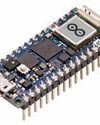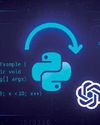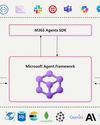Containerisation: The Cornerstone of Multi-Cloud and Hybrid Cloud Success
Open Source For You
|November 2024
Open source containerisation software provides the flexibility, cost-effectiveness, and community support needed to build and manage complex multi-cloud and hybrid cloud environments. By leveraging this software, businesses can unlock the full potential of multicloud and hybrid cloud architectures while minimising vendor lock-in risks.
-

Containerisation in the cloud is a key aspect of modern cloud computing architectures, particularly in multi-cloud and hybrid cloud environments. It involves encapsulating applications and their dependencies into lightweight, standalone units known as containers. This approach offers several benefits, including portability, fault isolation, ease of management, and simplified security.
The rise of multi-cloud and hybrid cloud architectures has dramatically reshaped the IT landscape. These models offer businesses greater flexibility, scalability, and resilience. However, they also introduce new complexities and challenges. Here, open source software emerges as a crucial enabler, providing a foundation for building and managing these intricate environments. The popularity of open source container platforms like Dockers, Kubernetes and OpenStack has led to rapid adoption of “write once and run anywhere” across on-premises data centres, hybrid cloud and multicloud environments. In addition to the flexibility, the architecture design speeds up development and prevents cloud vendor lock-in.
Understanding multi-cloud and hybrid cloud
Containerisation has become a cornerstone of modern cloud computing. Its benefits, such as portability and resource efficiency, make it a game changer. Understanding containerisation involves grasping the concept of encapsulating applications and their dependencies into lightweight, standalone units known as containers. Multi-cloud and hybrid cloud are two prominent cloud computing architectures that have gained significant traction in recent years, enabling the containerisation of applications.
Multi-cloud: This refers to the use of multiple cloud platforms from different providers, such as AWS, Azure, and GCP. It offers increased flexibility, vendor independence, and disaster recovery capabilities.
Denne historien er fra November 2024-utgaven av Open Source For You.
Abonner på Magzter GOLD for å få tilgang til tusenvis av kuraterte premiumhistorier og over 9000 magasiner og aviser.
Allerede abonnent? Logg på
FLERE HISTORIER FRA Open Source For You

Open Source For You
The Role of Open Source in Building Modern Data Infrastructure
It's no secret that open source is emerging as the backbone of modern data infrastructure. Here’s a list of the core open source technologies used to deploy this infrastructure, along with some real-world examples and a brief on why open source matters.
3 mins
December 2025

Open Source For You
The Whispering Machines: How Open Source is Bringing Intelligence to the Tiniest Devices
Built on open source frameworks, TinyML is enabling complex machine learning models to run on the microcontrollers embedded in connected devices, bringing artificial intelligence to the very edge of the network.
3 mins
December 2025

Open Source For You
Setting Up Snort to Secure Your Network
Snort is a popular, open source intrusion detection system that monitors traffic in real time to detect malware. Here’s a detailed explanation of how to set it up on Ubuntu and test it by generating traffic from another system.
7 mins
December 2025

Open Source For You
When AI Meets DevOps to Build Self-Healing Systems
Traditional DevOps, with its rule-based automation, is struggling to work effectively in today’s complex tech world. But when combined with AlOps, it can lead to IT systems that predict failures and solve issues without human intervention.
7 mins
December 2025

Open Source For You
How to Automate Java Code Modernisation
This short guide illustrates that automating Java code modernisation with Python and OpenAI API is not just possible-it's remarkably effective.
5 mins
December 2025

Open Source For You
The Quest to Build a Quantum Computer
The road to large-scale quantum computing is long and hard, with incremental advances paving the way. But the destination is in sight.
12 mins
December 2025

Open Source For You
Job Opportunities: What's Hot in the Cloud Space?
If there's one field that refuses to slow down, it's cloud computing. Even as automation and AI reshape roles, cloud adoption continues to surge. From startups deploying microservices overnight to enterprises migrating decades of legacy systems, cloud remains the engine of digital transformation. For professionals, this means one thing: skills that live in the cloud won't come down anytime soon.
2 mins
December 2025

Open Source For You
Securing Client Identity with Post-Quantum Cryptography
Here's a quick tutorial on how to build a secure, real world client-server model that establishes client identity by using CRYSTALS-Dilithium, a post-quantum cryptography algorithm.
3 mins
December 2025

Open Source For You
Unlocking the Power of Multi-Agent Solutions with the Microsoft Agentic Framework
The Microsoft Agentic Framework is rapidly emerging as a cornerstone for developers, architects, and technology leaders seeking to build dynamic, intelligent systems powered by multiple collaborating agents. In an era where automation, distributed intelligence, and adaptive software are increasingly vital, this framework offers robust tools and features to accelerate the design and deployment of agent-based solutions.
6 mins
December 2025

Open Source For You
Apache Iceberg and Trino: Powering Data Lakehouse Architecture
Apache Iceberg is a cornerstone of any open data lakehouse, providing the transactional foundation upon which highly scalable and flexible analytics can flourish. Along with Trino, it can be used to build a robust, scalable, and high-performance data lakehouse.
4 mins
December 2025
Listen
Translate
Change font size

